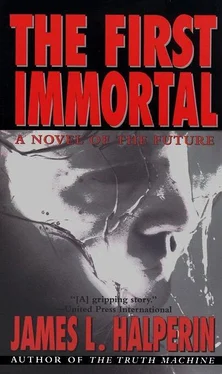That was the first time I’d ever wished I’d been born sooner, and the first time I really understood what a treasure our yesterworlders were. We who had seemingly rid ourselves of death now had too much, and it had come too fast. How could we have known?
I spread my hands so Gary could appreciate his sobering effect on his grand-nephew. “I suppose the machines, the AIs, given all the time we have, will devise a way to save us.”
Gary gave me a funny look. Ben slapped his hand against his forehead. Wendy II chuffed.
“What?” I demanded. It was crazy, completely disconcerting. Here, I was the acknowledged scientist, yet it seemed every other mammal in the room was looking at me as if I were a three-year-old who’d just wet his pants.
“Trip,” Ben said, his tone kind but indulgent, almost patronizing, “that’s what’s wrong with your whole overview on this.”
Gary nodded his head avidly.
Ben went on: “Whether the problem winds up a tempest in a teacup or Armageddon from the sky, the strategic solution will result from intuition and imagination, properties of human emotion. Properties no machine has.”
“Yes,” Gary said. Now the way he was looking at his father made me feel good, like they were allies not only of the mind but the spirit. “Machines, artificial intelligences, may offer priceless tactical advice, but they won’t know how to feel about it.”
“What’s that got to do with anything? It’s a scientific problem.” No sooner were the words out of my mouth than I felt like a moron. Had my emotional response been scientific? Were we forgetting so much of our basic nature so quickly?
Ben stood, then walked to stand directly in front of my body-sculpt chair. Worse, Wendy II padded over and hunkered against his leg. I guess dogs have an instinct for who the rightful pack leader is.
Shaking his head slowly while a strangely grandpalike smile spread over his face, he began a speech I’ll remember all my life. A hundred years, a million, a billion, or until the universe goes cold, I will never forget.
“We could implant intelligent machines in physical bodies like ours, or some other higher life-form’s. Hell, before you know it, we’ll be advanced enough to create a whole new species superior to ourselves. Sure, we could do that, but why would we? Then we’d have created a hyperintelligent competitive species. Such an act would be insane; would have a wholly unpredictable outcome. It would be as mad as a full-scale nuclear exchange in the 1980s, so I don’t expect it, even in light of today’s crisis.
“Therefore what we have are various machine enhancements to our own bodies and minds, plus artificial intelligence—without emotions. I’m sure I don’t need to explain to you that your emotions are manifest in your body’s physical response to your five senses, in concert with the reasoning capacity of your brain. Loud music can make you cry if you’re an infant, or give you joy if you’re an adult listening to Mozart…”
No, Ben hadn’t needed to explain it, but I somehow understood things better because he had.
“Now we’re faced with something unknown and to some degree unknowable, so our initial reaction is fear. How could it be otherwise? Right now, you find the fear paralyzing. But not for long, I predict. In fact, it’s that very fear that will save us.”
I sat there, thinking I’d understood. I almost rushed to him then. Almost told him how wonderful he was. I’m glad I waited.
“A husband and wife walk into a home furnishings show,” he mused. “We’ll say the year is 2010, because it’s a transitional time all of us can relate to, whether we lived it firsthand or not.
“Anyway, our couple presents their ticket stubs at the door. As they stroll inside the hall, someone marks the back of one of their hands with a small red dot, so they can gain readmittance without having to pay a second time.
“Husband and wife had a tiny spat that morning, so there’s a little wall of distance between them. Nothing serious, but it’s there. They stroll about for a little, then hubby spies a concession stand. Tells the wife he’s thirsty. They buy two cups of cola and sit down at tables provided for snackers. On their table is a vase of faux flowers, pretty but bland. Hubby’s still feeling bad about the morning’s tiff and wants to make the cloud go away. After all, he started it by whining that he didn’t want to go to the show in the first place. But he also can’t quite bring himself to admit all that.
“He looks at the red dot on his hand, then smiles. Says to wifey: ‘They can find us now.’ ‘Who?’ she asks. ‘The Bosnian secret agents,’ he replies; points to the dot. ‘There’s a homing device in the ink.’ Wifey’s expression doesn’t change, but she bends to one of the plastic flowers, whispering into it: ‘He’s on to us, Marvik.’ Both break into laughter, then reaching out, they find one another’s fingers.”
I looked at Gary; he was smiling. So was I, ear-to-ear, but didn’t understand why. I only knew I suddenly felt better, and glad to be a member of the human race. Still, I wondered, What was his point?
“Trip, could a machine have written that without human programming?” Ben asked.
“No,” I allowed, replaying Ben’s story in my head: action, sensation, emotion, humor, a goal, and success; all interwoven into a simple object-lesson on the nature of the human thinking process. “Any pure machine, no matter its computational or inductive-reasoning capacity, would have no frame of reference for it.”
“Exactly,” Ben said. “Because, unlike humans, machines don’t care what others think of them… or about anything else for that matter. The answers—and the desire to seek those answers—will come from our uniquely human combination of physical emotion and objective reasoning capacity, and our physical need to survive. Hell, even our tendency to disagree with each other at times, and our occasional bouts of irrationality,” he laughed, “might be indispensable to the creativity of civilization.
“We might construct great orbiting lasers. We might take shelter deep in the Earth’s crust. We might colonize new star systems. Or we may come up with a new solution through more creative, out-of-the-box thinking. Something no machine would ever consider. And whatever we do, humans will have to decide what and how. Sure, our machines could help us do any or all of these things, or help solve problems not yet conceived. But they can function only as our servants, not our saviors. And sometimes it takes a crisis to remind us of that.”
Wendy licked Ben’s hands as Gary began to clap his own.
After leaving me, Ben and Gary walked through the Japanese rock garden in front of my building. Their stroll hadn’t been planned, but when they’d left the place, their common gravity attracted; held them together.
Ben stopped at a crossroads in the perfect pathways, listening to the music of water dancing over pebbles. The small, rounded sandstones had been carefully placed, he knew, each angled to create perfect dulcet tones. This was a symphony of natural materials, finely tuned under the fingers of thoughtful human beings. Like himself.
Like his son.
“They’re going to need us, Gary. I used to worry about that all the time, you know.” Ben hunkered down on his knees and stared into the water. “Used to worry I had nothing to offer. But it wasn’t true. You and I, son, we both know how to think differently, because we came from a time before machines started thinking for us.”
Gary sighed and nodded.
Ben dipped a finger into the cool water. It felt wonderful. “I think it’s a genetic reversion, son. I think, like all events that bring forth disproportional responses in humans, we have a species memory, much akin to instinct. I think at times in the dim human past, comets and meteors must have struck the earth with devastating consequences. Nothing like the comets that killed the dinosaurs, of course, but terrible just the same. And millions of our ancestors must have witnessed such events. I guess the basic fear of objects falling from the sky never burned out of our genes.”
Читать дальше












